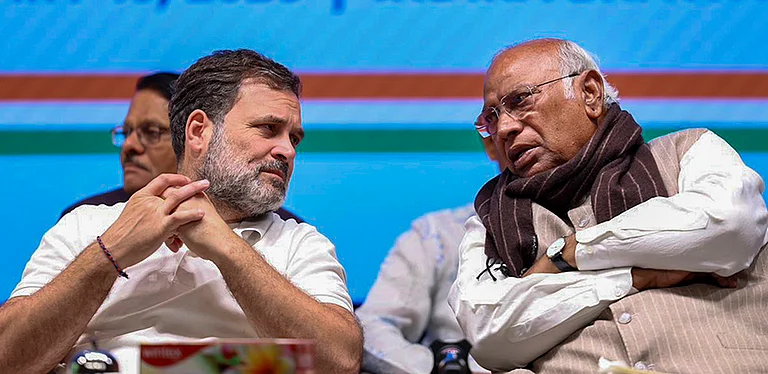Ghulam Nabi, a semi-illiterate migrant labourer from Kashmir, came to Shimla 21 years back as a young boy looking for work. Since then, he has been here making a peaceful livelihood. Now, in his 40s, he works as a porter and hardly manages four meals a day. These days, his job hunting ends up in disappointment and by evening he even struggles to buy himself meals from the savings he has had from the earlier day.
“There is no work. This coronavirus has spelt doom on us – the migrant labourers. The lockdown forced us to return home fearing starvation, hunger and infection. One and half years, I was totally jobless. Now, six months, I am here, there is no work, no earning. It’s a new kind of job crisis which has made life tough,” says Ghulam Nabi.
Fondly called 'Khans’ or “Khan bhayee” in Shimla’s parlance, there are 6,000 to 7,000 Kashmiri labourers, few of them in the second and third generation, working in the hill town. After the Covid pandemic, the number has come down to half. Many migrants, who returned to their homes in Kashmir, have not come back yet.
It’s not that they have found green pastures in Kashmir or got employed but it’s due to the job crisis in Shimla. The tourist’s arrivals have plummeted, the hotel business has been severely hit and markets are still struggling to normalcy. Eventually, the “Khans’ are the most affected section of the migrants.
Deepak Sharma, a businessman and BJP Councillor in local Municipal Corporation, says, “Khans are indispensable to Shimla’s daily life. As most goods are carried manually, Khans do it easily carrying the loads on their shoulders. Nothing can move in town -- even the bread and milk supplies to retail shops and homes -- without the Khans. They rather have become the town’s lifeline."
Whether it’s about transporting goods, LPG cylinders, furniture, delivery of ration at homes, heavy home utilities and other necessities of the families, they have been carrying these items on their backs for decades and safely delivering them.

But only fewer tourists are visiting Shimla. Barring the snowfall influx, the Kashmiri labourers spend their day sitting idly around the Mall Ridge and marketplaces or next to the Jama Masjid –a local mosque which is their trusted home to stay in a large group.
Bashir Ahmad,75, who hails from Qazigund (Kashmir) says, “Kashmiri labourers are really in grave distress. There are no jobs in Kashmir. That has forced many to migrate to Shimla. There was a time, I used to earn Rs 18,000 to 20,000 a month. Now, it is just a few hundred a day, sometimes less than the daily wage earners'.”
“I have a family of 10 members in Kashmir. My two sons, one 24 and the other 20, are also in Shimla to work as porters. The pandemic has broken our back. There are hardly any savings. We have to eat and pay rent out of what we earn here," he rues.
Though of late, young Kashmiri migrants have diversified to selling dry fruits, Kashmiri woollen shawls, running dhabas, meat shops, tea stalls and mobile repair shops. Few, who know English well, have started jobs as tourists guides and hotel bookings. But, there are no foreign tourists coming to Shimla since February 2020. Hence, they are engaged in porters jobs.
“As the problem of unemployment is huge in Kashmir, several youths, who have done post graduations or graduations, were working as labourers. Some of them returned back during the Covid and did not return after they realised that they will not be able to make enough earning,” Abid Hussain, a 47-year old native of Anantnag says.
Former Shimla Mayor Adarsh Sood, who also owns an LGP agency, claims that Kashmiri porters number have come down drastically, especially during the Covid time. This is mainly as their daily earnings have come down. Barring those attached with LGP agencies or big grocery and other stores, the rest are not finding work to make their earnings.
One of the best qualities of Khans is, as he praises, “They lug heavy loads to areas inaccessible by road. As children, we used to describe them as camels of the hills for their unparalleled strength and endurance. They have been virtually carrying the state’s economy on their shoulders but now they are really in bad times."
At the time of snowfall, Municipal Corporation also hires them for snow clearance works in the town and removal of fallen trees to open the blocked roads. They are really expert hands in these jobs.
Ishfaq,26, who has been a porter in Shimla for the past three years, reveals names of at least 10 to 15 youths from Kashmir, who have been doing porters' jobs in Shimla despite being post-graduates. After the pandemic, they have not returned as there is not enough work.
All of them are Muslims, most of whom hail from three districts, Anantnag, Kulgam and Kupwara. A majority then stay at Jama Masjid ‘musafirkhana’ — a transit lodge located in the town’s lower bazaar area, where they are provided bedding and blankets. Others stay in groups in small basement shelters in Middle Bazar, Lakkar Bazar and near the bus stand. There are 70 to 75 migrant workers also from Kargil.

The Shimla Police have no written record or account as to when Kashmiri porters started coming into Shimla. But, after militancy increased in the valley, their numbers increased. Unfortunately, the things have been reversed by Covid 19 adversely affecting their livelihood means.
Yet, people like Ghulam Hasan say, “There is no place like Shimla. The people are very hospitable and warm. The business community also repossess a lot of trust in them. Some traders also hand over the keys of their godowns and stores. They never bargain on their labour."
Bashir, 41 and a father of two, also shares his worries of soaring prices as whatever small earning he gets at end of the day goes on meals. Though there are six to seven other Kashmiri Khans at the “dhera” -- a shared common room -- their contributory cooking also costs each one almost Rs 200 to 300 per day for two meals.
“Our hopes on Kashmir opening-up jobs or generating employment once militancy is controlled has also not worked. Militancy and innocents killings have definitely been tackled but the government has done nothing on unemployment and development," Bashir says, adding that Shimla will continue to be their work place with hopes that things will change once Covid crisis is over.


























